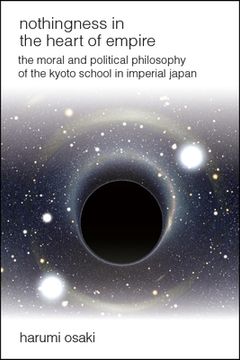Share
Nothingness in the Heart of Empire: The Moral and Political Philosophy of the Kyoto School in Imperial Japan (in English)
Harumi Osaki
(Author)
·
State University of New York Press
· Paperback
Nothingness in the Heart of Empire: The Moral and Political Philosophy of the Kyoto School in Imperial Japan (in English) - Osaki, Harumi
Choose the list to add your product or create one New List
✓ Product added successfully to the Wishlist.
Go to My WishlistsIt will be shipped from our warehouse between
Tuesday, July 09 and
Wednesday, July 10.
You will receive it anywhere in United States between 1 and 3 business days after shipment.
Synopsis "Nothingness in the Heart of Empire: The Moral and Political Philosophy of the Kyoto School in Imperial Japan (in English)"
In the field of philosophy, the common view of philosophy as an essentially Western discipline persists even today, while non-Western philosophy tends to be undervalued and not investigated seriously. In the field of Japanese studies, in turn, research on Japanese philosophy tends to be reduced to a matter of projecting existing stereotypes of alleged Japanese cultural uniqueness through the reading of texts. In Nothingness in the Heart of Empire, Harumi Osaki resists both these tendencies. She closely interprets the wartime discourses of the Kyoto School, a group of modern Japanese philosophers who drew upon East Asian traditions as well as Western philosophy. Her book lucidly delves into the non-Western forms of rationality articulated in such discourses, and reveals the problems inherent in them as the result of these philosophers' engagements in Japan's wartime situation, without cloaking these problems under the pretense of "Japanese cultural uniqueness." In addition, in a manner reminiscent of the controversy surrounding Martin Heidegger's involvement with Nazi Germany, the book elucidates the political implications of the morality upheld by the Kyoto School and its underlying metaphysics. As such, this book urges dialogue beyond the divide between Western and non-Western philosophies, and beyond the separation between "lofty" philosophy and "common" politics.
- 0% (0)
- 0% (0)
- 0% (0)
- 0% (0)
- 0% (0)
All books in our catalog are Original.
The book is written in English.
The binding of this edition is Paperback.
✓ Producto agregado correctamente al carro, Ir a Pagar.

